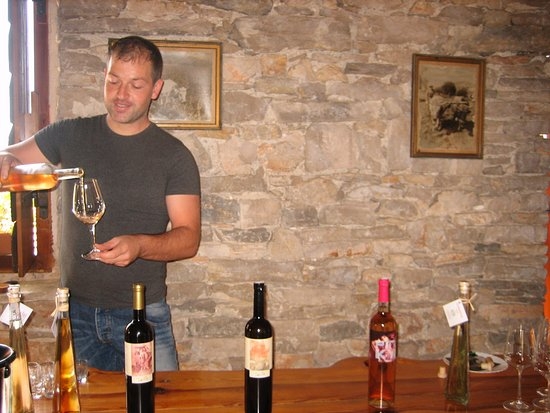All of the interviews in the series are going to be similar, with 8 same questions and 2 questions tailored specifically for each winemaker (those two will be easy to spot, as they will be coloured differently).
Could you please introduce yourself, your winery, your wines for our readers. How did you get into winemaking, and can you tell us a bit about your ethos of making wine?
Toreta Winery is a family winery, owned by the Baničević family. Our great-grandfather Luka was one of the first private winemakers in Dalmatia, and it was from him that we inherited the love for viticulture and winemaking.
My father has founded Toreta Winery in 1997, and today our family produces around 40000 bottles of wine per year. We grow pošip, rukatac and plavac in our vineyards.
Out philosophy is to take that which the nature is giving us, and try and use a lot of love and passion to nurture it to a premium wine.
How was the last harvest in your vineyards? What do you expect of the 2016 wines? Do you have any specific expectations, plans or hopes for this vintage?
2016 was a very demanding year in the vineyards, and that work resulted in an excellent harvest, probably one of the best ones in the last few years.
What are the Croatian wines (up to three whites and three reds) you think everyone should buy and taste at least once (not including any of yours, please)? Why?
Krajančić Statut, Korak Chardonay sur lie, Crvik Dubrovačka Malvazija, Miloš Stagnum, Postup Mare, Stina Mali plavac Majstor
Each of the wines I mentioned is special and original, in their own ways. Also, they are made by the winemakers I consider to be among the best winemakers in Croatia.
Which is better, grk or pošip? Or, on a more serious note, is it a good thing for an island the size of Korčula to have two indigenous recognizable grape varieties, with clearly defined locations where they’re grown? Can the “competition” between grk and pošip be better used to brand both wines?
Pošip is better!!!
Korčula has, in addition to pošip and grk, rukatac and plavac mali and other varieties that aren’t worse than pošip or grk.
And that is Korčula’s treasure.
The so-called “competition” of winemakers on Korčula results in wines getting better each year. Korčula is becoming the destination where more and more people arrive because of what we offer in terms of food and wine, and the wealth of what we offer and our cooperation certainly helps with that.
What do you think about the situation in the Croatian winemaking these days? What would you change if you could, regarding the legislation, the market or anything else? Would you agree with the idea that Croatian wines are too expensive, which is something you can often hear?
The winemaking in Croatia has reached a very high level these days. The wines we produce have come a long way in the past 25 years. Also, a lot has been invested into the wineries, so that could be a part of the reason why the prices of wines cannot be lower.
How do you see the relationship between the Croatian restaurants and the winemakers? Do Croatian restaurants promote and appreciate Croatian wines as much as they should, how do their margins affect the sale of Croatian wines?
Restorateurs promote our wines sufficiently, and their margins are what they are. I think that the restorateurs are trying to sell as much wine as possible, as it is also in their best interest.
How do you feel about the increasing number of winemakers outside of Korčula that have recently started growing pošip and making excellent wines? Does that expansion of the locations where pošip is grown help the recognition of the variety and of you, the winemakers from Korčula, or so you believe it should somehow be protected and only “korčulan”?
The spreading of the locations where pošip is being cultivated will only help the pošip brand, and more there is of it, the more well known it will become.
Winemakers in Korčula shouldn’t be worried about it, because our pošip on Korčula will always be recognized on the market as the original, different and the best one.
What do you think about the future of wine-making in Croatia, strategically how should it advance? Should we attempt exporting more Croatian wines? Can you comment on the changes which happened after our accession to the EU, specifically weigh in on the benefits of a larger market for export vs. the dangers of easier import of cheaper wines?
I don’t think that much has changed in the wine business since we joined the EU. It would be certainly great if we could export more wine; however I think that some changes are happening in that sense and that the Croatian wines are getting more popular around the world, and that is, of course, increasing the export as well.
Do you think new vineyards in Croatia should be mostly indigenous varieties, or should more international wines be planted?
My opinion is that we have a large number of indigenous varieties, that their quality is excellent and that we should put our focus mostly on those indigenous varieties.
Paint us a picture of a perfect setting for enjoying a bottle of your wine. Which bottle did you choose, why?
We invite you to come to Smokvica, the homeland of pošip, visit our winery and we will present you with a glass of our wine, take you back in time to the past and tell you the tale of pošip.
Previously in the series of interviews: Tomislav Tomac











